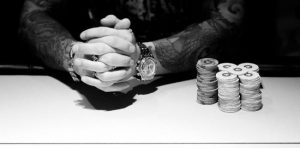
We have already reviewed the art of randomness and emotional dynamics, which lead to the most important psychological element – image. Image is the picture that describes a player's behavior as seen by other players. It is the foundation on which players are evaluated at the poker table. This definition makes the concept broad and complex, so let's examine everything in detail.
The first important rule is a strong first impression. The strength of this impression determines the first acquaintance, which is deeply ingrained in memory and is universal. Often, this first encounter is so deeply entrenched that even later information does not change its experience.
For example, if you sit at the table and 3-bet twice in the first couple of hands (perhaps the second time you did it for value), your opponent will immediately decide that you are a super aggressive 3-bettor. Even if after twenty hands your frequency becomes completely normal, it will take quite a while for the opponent to get rid of the conclusions of the first impression describing you. And even if he changes his formed model about you, he will immediately return to it if he sees a series of 3-bets again.
You should take advantage of such laws of human psychology. Always be alert to what first impression you are creating for another player and how it will affect him. Instead of thinking about your true playing style, learn to focus on what the opponent sees you doing in the first moments of your game.
The second main rule of image is the projection of impression. These are subconscious assumptions that other people think like us, that another player perceives poker as we do, and behaves as we would in that situation. It is important to understand this point: most poker players expect others to think and act like themselves. Such thoughts allow them to think that everyone is the same; a conservative player will expect others to play conservatively, and a loose player will expect others to play in a loose style.
Simply put, if you play against a nit, he will probably conclude that you are more nitty than you actually are; if you play against a maniac, he will expect you to play maniacally as well. This does not mean that they expect you to do everything exactly like them; rather, your behavior in their perception will lean towards their own style. Such knowledge will help reconstruct other players' perceptions and expectations about you.





